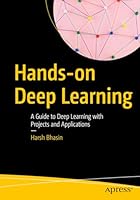
C++ 14 Quick Syntax Reference: 2nd Edition
- Length: 131 pages
- Edition: 2nd ed. 2015
- Language: English
- Publisher: Apress
- Publication Date: 2016-04-09
- ISBN-10: 1484217268
- ISBN-13: 9781484217269
- Sales Rank: #1817061 (See Top 100 Books)
This updated handy quick C++ 14 guide is a condensed code and syntax reference based on the newly updated C++ 14 release of the popular programming language. It presents the essential C++ syntax in a well-organized format that can be used as a handy reference.
You won’t find any technical jargon, bloated samples, drawn out history lessons, or witty stories in this book. What you will find is a language reference that is concise, to the point and highly accessible. The book is packed with useful information and is a must-have for any C++ programmer.
In the C++ 14 Quick Syntax Reference, Second Edition, you will find a concise reference to the C++ 14 language syntax. It has short, simple, and focused code examples. This book includes a well laid out table of contents and a comprehensive index allowing for easy review.
What You’ll Learn:
- How to Compile and Run
- What are C++ Variables, Operators, Pointers and References
- What are Arrays, Strings, Conditionals, Loops and more
- How to use Functions
- How to work with Constructors and Inheritance
- How to use Access Levels, Static, Enum, String and Union, and more
- What are Custom Conversions, Namespaces, Constants, and Preprocessor
- How to do Event Handling
- What are Type Conversions, Templates, Headers, and more
Audience
This book is a quick, handy pocket syntax reference for experienced C++ programmers, and a concise, easily-digested introduction for other programmers new to C++.
Table of Contents
Chapter 1: Hello World
Chapter 2: Compile and Run
Chapter 3: Variables
Chapter 4: Operators
Chapter 5: Pointers
Chapter 6: References
Chapter 7: Arrays
Chapter 8: String
Chapter 9: Conditionals
Chapter 10: Loops
Chapter 11: Functions
Chapter 12: Class
Chapter 13: Constructor
Chapter 14: Inheritance
Chapter 15: Overriding
Chapter 16: Access Levels
Chapter 17: Static
Chapter 18: Enum
Chapter 19: Struct and Union
Chapter 20: Operator Overloading
Chapter 21: Custom Conversions
Chapter 22: Namespaces
Chapter 23: Constants
Chapter 24: Preprocessor
Chapter 25: Exception Handling
Chapter 26: Type Conversions
Chapter 27: Templates
Chapter 28: Headers

Arduino & MicroPython with ESP32: A Beginner's Guide to Hands-On Learning and DIY Projects - Part 1






